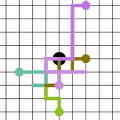It is well known that the spectral gap of the down-up walk over an $n$-partite simplicial complex (also known as Glauber dynamics) cannot be better than $O(1/n)$ due to natural obstructions such as coboundaries. We study an alternative random walk over partite simplicial complexes known as the sequential sweep or the systematic scan Glauber dynamics: Whereas the down-up walk at each step selects a random coordinate and updates it based on the remaining coordinates, the sequential sweep goes through each of the coordinates one by one in a deterministic order and applies the same update operation. It is natural, thus, to compare $n$-steps of the down-up walk with a single step of the sequential sweep. Interestingly, while the spectral gap of the $n$-th power of the down-up walk is still bounded from above by a constant, under a strong enough local spectral assumption (in the sense of Gur, Lifschitz, Liu, STOC 2022) we can show that the spectral gap of this walk can be arbitrarily close to 1. We also study other isoperimetric inequalities for these walks, and show that under the assumptions of local entropy contraction (related to the considerations of Gur, Lifschitz, Liu), these walks satisfy an entropy contraction inequality.
翻译:暂无翻译



